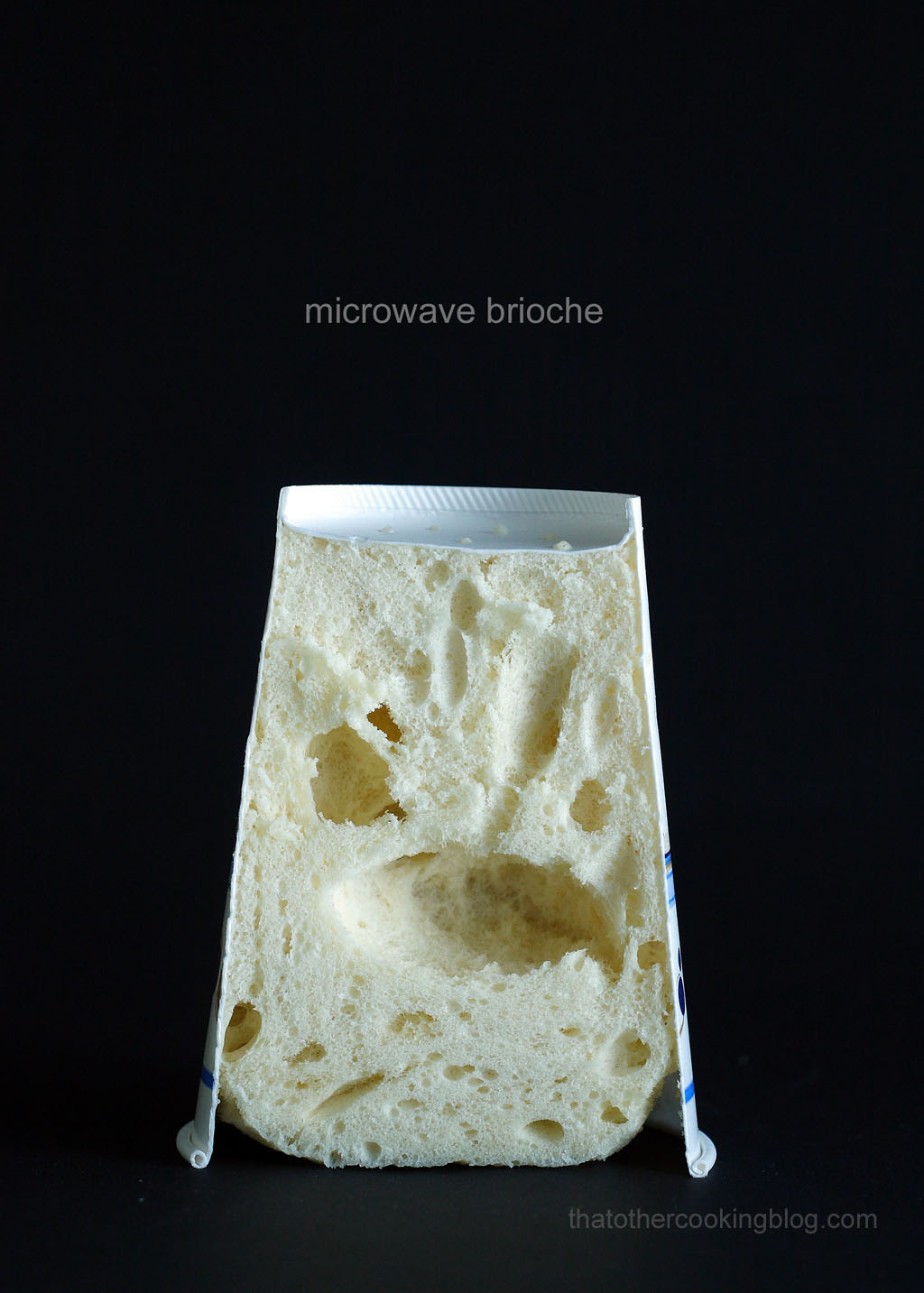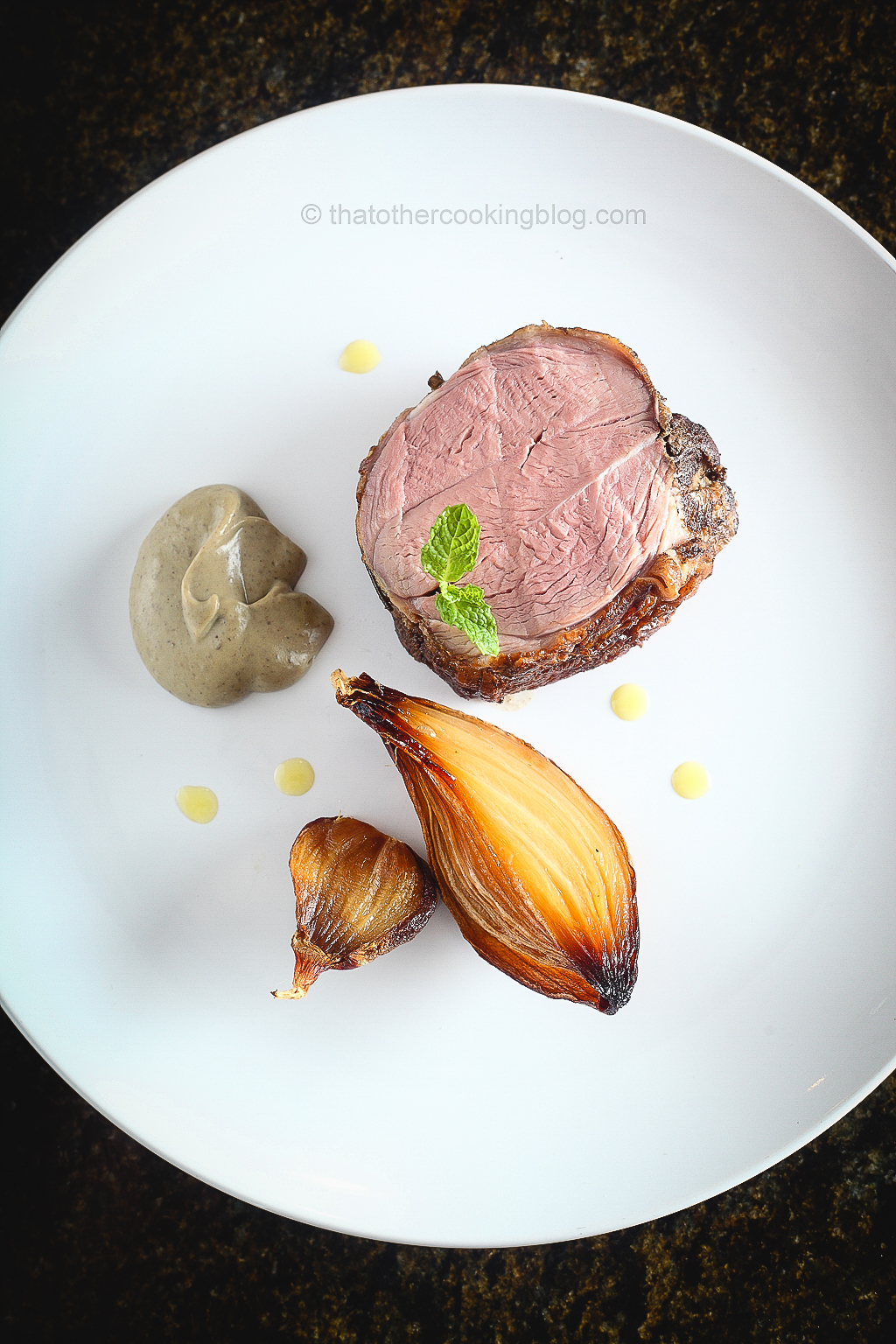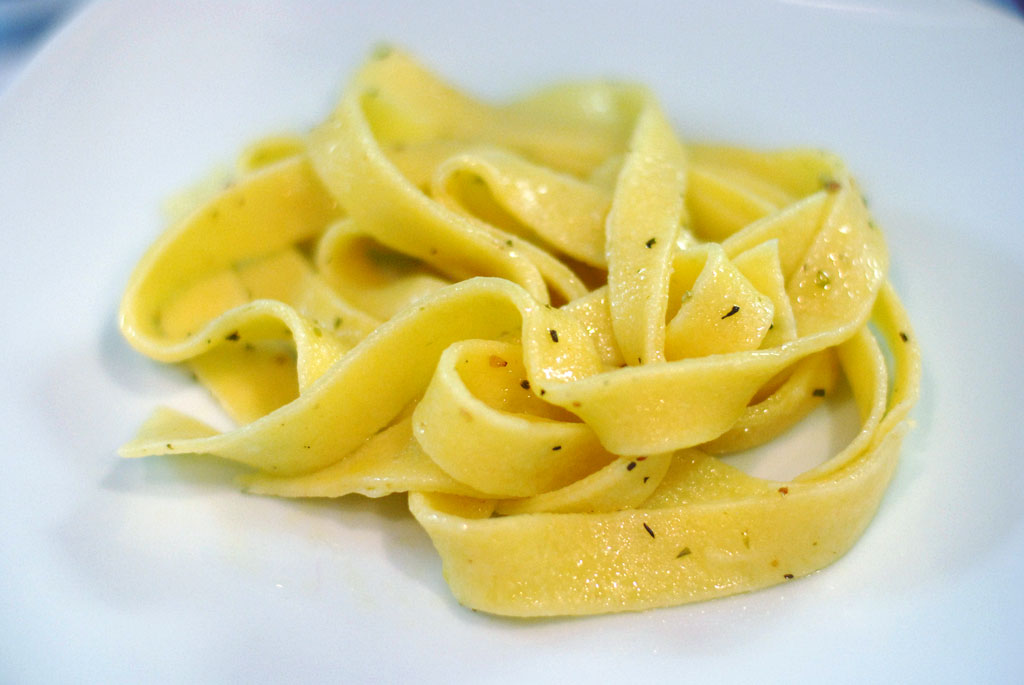First of all, if you haven’t, please follow me on Instagram! 🙂 Brioche in the microwave… well… the soft tender interior that is. I came across this clever idea while browsing the book VOLT ink.: Recipes, Stories, Brothers at a Barnes and Nobles on 3rd street promenade in Santa Monica. Pretty awesome book full of interesting ideas and new and modernists approaches to cooking. I haven’t bought it but it is definitely on my list. Although I got the idea from the Voltaggio Bros’, I’ve also seen similar recipes by Ferran Adrià, who used to run one of the most innovative kitchens in the world at El Bulli restaurant. He might have been the first one to try this, but I can’t find much information about it. If you know, share it in the comments section please!

El Bulli has been recently turned into sort of a food idea development center… Ferran now owns and runs the recently founded restaurant Tickets Bar in Spain. Back to the microwave brioche… the “gimmick” in itself is simple but only after understanding how it works. A light batter is placed inside a cream whipper which is then charged with nitroux oxide cartridges and leavened this way. The cream whipper will scatter thousands of tiny little bubbles of NO into the batter.
There are 2 important principles at work behind microwave brioche:
1. gasses expand when heat is applied
2. flour starches gel at little under 212F (water boiling point at sea level)

These are the principles behind traditional bread too.
In traditional bread, yeast does the work of creating the tiny bubbles that will eventually cause the bread to rise.
Yeast does other wonderful things as well, it ferments and imparts a very special flavor must of us love. Our modernist bread recipe isn’t yeasted, so the flavor isn’t as complex but it still works and with some creativity, this bread can be flavored in so many interesting ways.
I believe that this bread could be made with yeast too in which case the cream whipper wouldn’t be necessary. I want to try this soon (and in a way I had when I made the Baozi buns). Anyways, when the whipped batter is heated, the water in it heats up, causing the tiny bubbles to expand and on top of that, some water evaporates and the steam helps the expansion even further. In the end it looks like a very yummy sponge. There won’t be any browning or crust of course. Caramelization and Maillard reactions* can only occur well above the water boiling point temperature which is what is reached inside the microwave (fats in a microwave will heat up to much higher temperatures than 212F, please do not try to heat up a cup of oil in the microwave, it is dangerous. It will get extremely hot.)
* The Maillard reaction actually happens at room temperature but it is greatly sped up by applying heat.
Ok, so let’s get ready to make this.
One important thing to keep in mind, the sponge will deflate a bit while still in the microwave oven. This is something that wouldn’t happen to bread in a real oven (it does happen but at such small scale is not really that noticeable) because the starches have been given enough time to set. Once our bread deflates a bit it’s a good sign that microwaving time is enough and the brioche is ready. Gasses and water vapor have left the bread. Further microwaving would dry out the bread and turn it into a solid dry stale piece of brioche.

Gear:
Blender
Isi Cream whipper
2 NO cartridges
a few paper cups
small spatula or butter knife microwave
Ingredients:
200g AP flour
2 eggs
50g unsalted butter
4g kosher salt
50g sugar
150g milk

Here is what you do.
Prep a paper cup (I had multiple ones ready just in case, and there is enough batter for a few tries). You can butter the inside of it or oil it so the bread doesn’t stick. It has been suggested that you puncture holes on the dixie cup, but after some testing, I don’t see much of a difference in the textures. Perhaps the sponginess of the brioche cooked in the punctured cup was better, but I have to run more tests.
Blend all the ingredients together and strain (if it isn’t too thick otherwise just don’t) into the cream whipper canister. Then load it with 2 cartridges of nitrous oxide. shake really well. We want 2 cartridges because the batter is thick and it isn’t easy to whip gas into it. One cartridge wouldn’t have enough pressure to achieve that.
Fill cup half way with mixture, I recommend working one cup at a time because like crepes, the first one is always thrown away. But in this case you want to test different times until your brioche is just right. Every microwave is different so you will have to test and fine tune! how fun!
The microwaving.
I microwaved the cup for about 1 minute and a few extra seconds but yours could take more or less time. Immediately take out of the microwave and flip upside down, if you oiled or buttered the cup, the bread will slide right off. Be gentle when handling it and also be careful, it is a hot hot hot delicate sponge. If you didn’t oil the cup, you will need a spatula to help you extract the bread from the cup, it will be slightly stuck in it. And that is it!

Have you tried microwaved brioche?! Share your experience with us! Until the next one!
Wanna get more sous-vide cooking guides and cool cooking how-to’s in your mailbox? You know what needs to be done!
We never spam. You should only be getting updates when new content is posted on the site. We also respect your privacy. We don’t share your email address with anyone and you can unsubscribe anytime!





27 comments
Amazing …. I just love brioche!
thanks Viveka! Brioche is amazing, I love it too.
Great post Paul, extremely interesting. I’ve wondered for a while how to the fluffy brioche-type stuff that I often get with desserts at starred restaurants was made, and it looks like it’s this. You can see it on the photo in my recent post about Librije.
thanks Stefan! yeah, it think it might have be a very similar technique… and am sure way tastier! 🙂 Glad you enjoyed it!
Just made my first microwaved sponges last night — octopus flavored! Post will published on the 28th.
that sounds interesting! can’t wait to read it, were you happy with them?
The texture and flavor were fine. We should have used bigger cups for the plating we had wanted to do though.
now I’m really curious 🙂
Fascinating stuff, Paul. I’ve watched the Voltaggio Brothers and, if I’m not mistaken, Richard Blais did something similar recently. Thanks for taking the time to explain the science behind the brioche. I doubt that I’ll ever have NO cartridges around here but, if I do, I’ll know where to come for help. 🙂
Thank you John!!!! I’m not familiar with Richard Blais. I still think that you could pull this off without NO just by adding yeast to the batter, and letting it raise, but I haven’t tried it. I really want to try it though 🙂
Blais was Top Chef Season 8. He’s known for his innovative approach, using molecular gastronomy to great effect.
Ive only watched one season (partially) of Top Chef and I really enjoyed it, some of those chefs were incredibly talented. I wish it was on netflix! thanks John!
This is AWESOME! And fascinating! I loved the science behind the microwave brioche. Oh, those crazy molecular gastronomists! But seriously, this looks fantastic. Did you end up toasting the brioche? Or did you use a mini blowtorch? 🙂
Hey baconbiscuit, you’ve been away for some time! glad to see you back 🙂 I ended up frying it, filled a pan with about 1 centimeter of vegetable oil, hot hot, and submerged the brioche cube in it for a few seconds, done! that created a really crispy crust. super simple. thanks for your comment and am glad you stopped by! 🙂
Haha. Yes, my grandfather is turning 90 and it has been crazy with my parents and brother in town, along with all the rest of the family. Big family, big celebration. But am trying to catch up when I can!
Ah! So that’s how you did it. Looks terrific. I wonder what the cubes would be like dipped in caramel . . .
oh fun! my mom and aunt are coming to visit in two weeks, for a month so I’m sure I’ll disappear for a bit as well 🙂 it’s hey birthday soon, my mom’s 🙂
It was my grandfather’s birthday yesterday. We’re all recovering today!
hahahah! 🙂 good good
Yeah. It’s a realfeel temps of 107 today. Have not left the apartment once.
That and I partied a little too hard with gramps last night 🙂
hahahhah, nice!
Just fell over your microwaved brioche and gave it a try. Excellent! No the composition for a Christmas dinner starts. The brioche will get its part in it. Thank ou Paul.
Oh! so glad to hear! you should email me the pics if you don’t mind! thanks so much for your comments and for trying this!